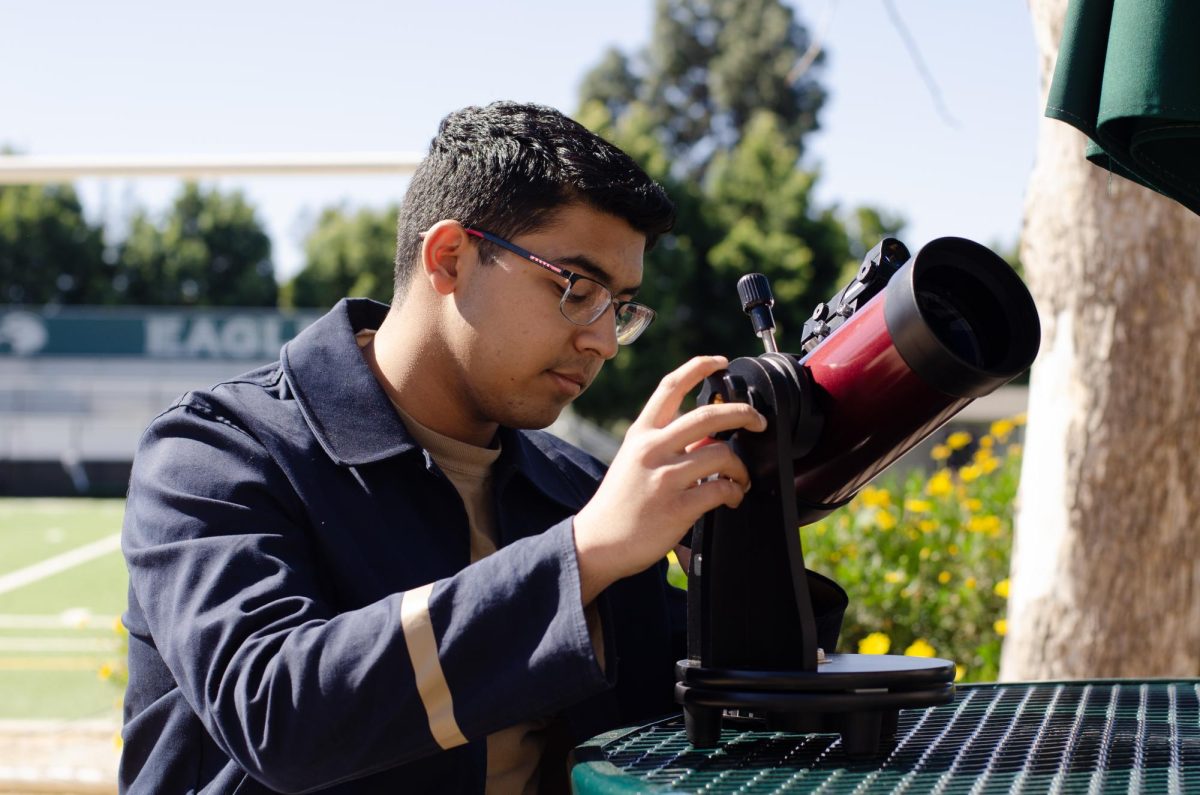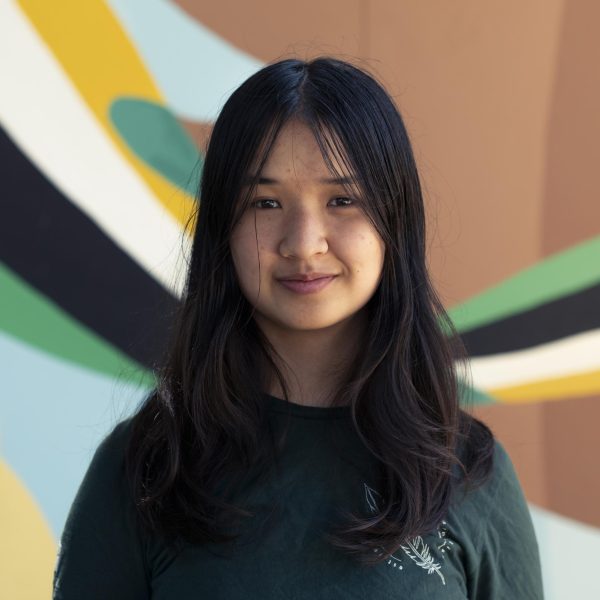Trails of vapor streak through Arnav Swaroop’s (12) homemade cloud chamber. They dash and twirl, then dissipate back into invisibility. The creation of each streak comes as supercooled alcohol vapor condenses after being ionized by a cosmic ray that zips through Arnav’s room. Then, he turns on his particle accelerator.
Since watching Star Trek as a young child, Arnav Swaroop (12) remained fascinated by space and astronomy. Over time, this passion grew to encompass particle physics as well. In addition to participating in internships and formal research projects, he also embarked on numerous personal explorations and passion projects, including building his own linear particle accelerator and cloud chamber.
“Usually when you read about these things you don’t have a relation to them,” Arnav said. “But when you have a cloud chamber you can see everything going by and see what is a proton what does an electron look like, and that inspired me to try to learn more about this.”
Arnav adds that the challenges he faced while working on his projects only add to his excitement when they finally succeed. For instance, he faced many delays in building his particle accelerator due to trouble sourcing government regulated materials.
“Recently in the past few weeks when it finally started working, it did burn up and worked only once, but it still felt really satisfying for everything to actually work,” Arnav said. “Similarly, with my research, things oftentimes don’t go your way and it’s really really frustrating. But when they do go your way it feels great, and I guess I’m kind of addicted to that feeling.”
Close friend since sixth grade Ethan Liu (12) adds that Arnav always remains determined to further his interests, even finding ways to gain access to the intricate control rooms of observatories.
“He’s very interested in astronomy and he convinced his parents to let them go to Europe for a week to tour all the accelerators and the observatories,” Ethan said. “And during the tours, even snuck out of the tours to go into some of the control rooms and stuff and take a peek around.”
In addition to pursuing independent projects, Arnav also sought other research opportunities to further delve into physics and astronomy. One of the first was the Science Internship Program in the summer after sophomore year where he applied particle physics techniques to astronomy.
“I had a particle astrophysics project with blazers, which are black holes that pulse huge amounts of charged particles towards us,” Arnav said. “And then, in my next work at CFA, I used similar particle astrophysics techniques, but instead applying that to analyze exoplanet atmospheres. I’ve continued that and this year I started working with the Center for Astrophysics, the Smithsonian and Harvard.”
From being the president of the astronomy club and the co-president of the physical sciences club at Harker to research projects with his friends, Arnav also demonstrates a remarkable ability for leadership. Close friend William Zhang (12) adds that many of his leadership abilities stem from the same traits that make him a great friend.
“When working on science projects, he has a good sense of who is busy and when, so he assigns tasks and stuff accordingly,” William said. “He also he also judges people in a school where we face a lot of academic pressure based on how hardworking they are whether how good of a person but rather than just by superficial or outward things, which is something I really liked about him, and he really takes his time to get to know his friends. I can tell he really wants to know each person individually and collaborate with them effectively. He’s very keen of people’s different people’s needs.”
Although he spends much of his time immersed in research and academics, Arnav also loves to have fun and freely explore new possibilities.
“I like messing around and just trying new things, which I’ve done a couple of things like that,” Arnav said. I flew my drone over Normandy over the D Day beaches. And then I went on a trip to Alaska with Mr. Spenner over the summer, which is pretty awesome. I had a bunch of new experiences there like seeing the whales when you wake up.”
Upper school research teacher Chris Spenner first met Arnav when Arnav invited him to teach the astronomy club about astrophotography. Spenner also taught him in advanced research and system science classes, quickly learning about Arnav’s curiosity and willingness to explore new ideas.
“He’s also very friendly, very willing to talk to people,” Spenner said. “Very curious about what they do with their projects. Quirky at times, once going to Alaska and having a major goal being seeing a bear. But also goal driven, really does the work to get stuff done. It comes back to that first impression, just how willing he is to take a chance on a field or topics that he didn’t really have much prior experience with. And it’s becoming an even greater strength for him is rather than speaking with with pretend authority, speaking with a little bit of skepticism about his own thoughts and being willing to hear critiques and justify his thinking”
Although it’s been many years and he’s learned much more about science since he first watched Star Trek, the same fundamental sense of awe and inspiration continues to drive Arnav.
“I’m interested in particle physics and there’s a lot of parallels in astronomy, and there’s a lot of physics techniques that you can use,” Arnav said. “If you solve a math equation, the plus or minus in the square root, you get like plus root two or minus root two. But in astronomy and physics if you solve something differently, you can create a completely different reality. For example, that’s how the positron, the positive charged electron, or antimatter was found was that people solved equations differently. Or black holes with rings. That you can go through like the black holes. It’s a similar process that really inspires me that you can sort of manipulate reality.”
Whether he’s exploring concepts through personal projects or researching at universities, learning about science is not only exciting but, more importantly, practically useful. Most of all, astronomy and physics allow Arnav to view life through different perspectives.
“I think it’s fantastic how many different possibilities there are. It really makes us feel like all of our problems feel very small — it’s humbling,” Arnav said. “At the same time, it’s also very very exciting because there’s a huge realm of possibilities, both our own capabilities and we can also take inspiration from what we see up there and recreate it down here to advance our technology.”


















![“[Building nerf blasters] became this outlet of creativity for me that hasn't been matched by anything else. The process [of] making a build complete to your desire is such a painstakingly difficult process, but I've had to learn from [the skills needed from] soldering to proper painting. There's so many different options for everything, if you think about it, it exists. The best part is [that] if it doesn't exist, you can build it yourself," Ishaan Parate said.](https://harkeraquila.com/wp-content/uploads/2022/08/DSC_8149-900x604.jpg)




![“When I came into high school, I was ready to be a follower. But DECA was a game changer for me. It helped me overcome my fear of public speaking, and it's played such a major role in who I've become today. To be able to successfully lead a chapter of 150 students, an officer team and be one of the upperclassmen I once really admired is something I'm [really] proud of,” Anvitha Tummala ('21) said.](https://harkeraquila.com/wp-content/uploads/2021/07/Screen-Shot-2021-07-25-at-9.50.05-AM-900x594.png)







![“I think getting up in the morning and having a sense of purpose [is exciting]. I think without a certain amount of drive, life is kind of obsolete and mundane, and I think having that every single day is what makes each day unique and kind of makes life exciting,” Neymika Jain (12) said.](https://harkeraquila.com/wp-content/uploads/2017/06/Screen-Shot-2017-06-03-at-4.54.16-PM.png)








![“My slogan is ‘slow feet, don’t eat, and I’m hungry.’ You need to run fast to get where you are–you aren't going to get those championships if you aren't fast,” Angel Cervantes (12) said. “I want to do well in school on my tests and in track and win championships for my team. I live by that, [and] I can do that anywhere: in the classroom or on the field.”](https://harkeraquila.com/wp-content/uploads/2018/06/DSC5146-900x601.jpg)
![“[Volleyball has] taught me how to fall correctly, and another thing it taught is that you don’t have to be the best at something to be good at it. If you just hit the ball in a smart way, then it still scores points and you’re good at it. You could be a background player and still make a much bigger impact on the team than you would think,” Anya Gert (’20) said.](https://harkeraquila.com/wp-content/uploads/2020/06/AnnaGert_JinTuan_HoHPhotoEdited-600x900.jpeg)

![“I'm not nearly there yet, but [my confidence has] definitely been getting better since I was pretty shy and timid coming into Harker my freshman year. I know that there's a lot of people that are really confident in what they do, and I really admire them. Everyone's so driven and that has really pushed me to kind of try to find my own place in high school and be more confident,” Alyssa Huang (’20) said.](https://harkeraquila.com/wp-content/uploads/2020/06/AlyssaHuang_EmilyChen_HoHPhoto-900x749.jpeg)




